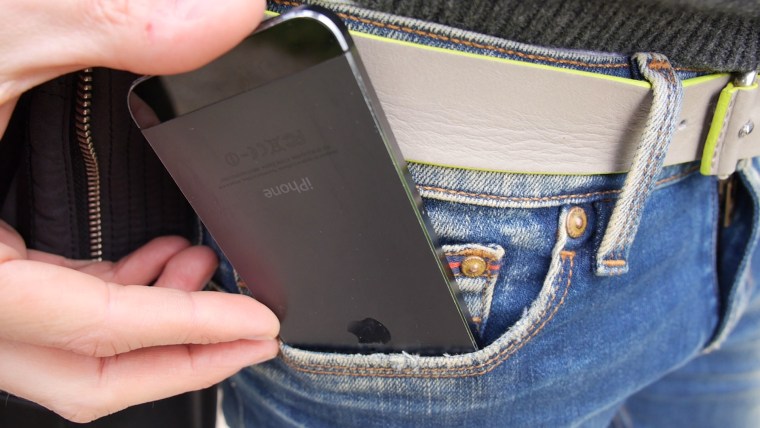MAINZ, Germany — The general principle of underwear is that it's designed to hold things in — not keep them out.
But one startup in Germany has designed a pair of boxer shorts to protect the wearer's nether regions from getting zapped by cellphone radiation.

The undies by Kronjuwelen — meaning "crown jewels" — are laced with protective silver threads that the firm says absorb 98 percent of radiation from cellphones and about 70 percent from wifi.
Despite years of studies, the World Health Organization, National Cancer Institute and other experts say there is no consistent evidence to suggest that cellphones are seriously harmful to the people who use them.
This has not stopped Kronjuwelen selling the boxer shorts — available in four sizes and one color — at $32 a pair.
"Scientifically proven or not … we did not want to live with these potential risks anymore"
"All of us in the company are reaching the age where we are thinking of having children," 31-year-old Nick Piepenburg, one of four co-founders, told NBC News of the decision to start the firm in 2014.
The quartet admit in their online mission statement that they are "neither radiologists, physicists, nor cancer researchers, and we cannot finally determine the risks of mobile phone radiation."
They added that "scientifically proven or not … we did not want to live with these potential risks anymore."
The firm's founders realize that any protective measures would be too late for their sperm but have vowed to protect the "next generation" of cellphone addicts.
Interest in the Duesseldorf-based firm "spiked significantly" last month, according to Piepenburg, after a study published in the Journal for Reproductive Biomedicine said "certain aspects of cellphone usage may bear adverse effects on sperm concentration."

The study was conducted by researchers at Israel's Technion University and involved a sample size of 106 men who had already been referred for semen analysis.
Professor Martha Dirnfeld told NBC News that those who carried their cellphone less than 50 cm (19 inches) from their groin had "a higher rate of abnormal sperm concentration."
But she also added that these results could have just as easily been caused by heat rather than electromagnetic radiation — and stressed that the boxer short design needed to prove its effectiveness at tackling both.
"Due to the emitted heat, men who seek fertility are advised to turn off their devices or keep it away from their bed side while charging their phone," she told NBC News.
"Mobile phones have been in public use for less than 15 years, while many cancers need 20 years or more to develop."
The study concluded that "certain aspects of cellphone usage may bear adverse effects on sperm concentration," but concluded that a larger-scale study was needed.
Almost 200 million people in the U.S. owned smartphones as of January. But despite the study at Technion University, most international bodies agree that no research has consistently proven cellphones are harmful.
The World Health Organization says "it has become increasingly unlikely that exposure to [cellphones] constitutes a serious health hazard." However it, acknowledges that some health problems could take decades to develop and that "some uncertainty remains."
One of the difficulties in establishing a causal relationship between cellphone radiation and cancer, according to the European Environment Agency, "is related to the fact that mobile phones have been in public use for less than 15 years, while many cancers need 20 years or more to develop."
For now, however, scientists have not been able to prove a link. This is because the devices emit something called "non-ionizing radiation," which is less powerful that the cancer-causing "ionizing radiation" of x-rays and nuclear fuel, according to the National Cancer Institute.
"There is currently no consistent evidence that non-ionizing radiation increases cancer risk," the institute said.
This science is what has led experts to doubt protective technology such as the Kronjuwelen underwear.
"It's is highly unlikely that pollution levels would be generated that would make radiation-proof underwear necessary," said Thomas Gritsch, an expert in cellphone technology at German consultancy TUV Sued.
However, Gritsch conceded that more testing may be required in the future.
"A few years ago, we saw public protest against transmitter towers, at a time when they were rather harmless," he said. "But today, mobile phone providers have massively upgraded, giving masts high transmission power that, in fact, could prove hazardous."
